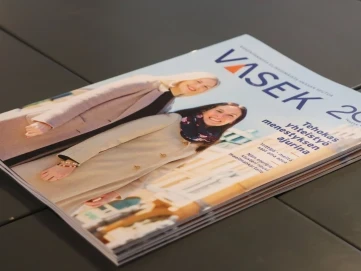Consumers Almost Imperceptibly Encouraged towards Energy Efficiency
The targets which are in accordance with the European Union's climate and energy package obligate member states to cut their greenhouse gas emissions by 20 percent, to increase the proportion of renewable energy to 20 percent of consumption and to improve energy efficiency by 20 percent, all by 2020.
The targets which are in accordance with the European Union's climate and energy package obligate member states to cut their greenhouse gas emissions by 20 percent, to increase the proportion of renewable energy to 20 percent of consumption and to improve energy efficiency by 20 percent, all by 2020.
Finnish energy policies are mainly derived from these targets and domestic circumstances.
"Both reducing emissions and increasing renewable energy production have been subjects of intense discussion within Finnish energy politics over the last few years, whereas the subject of increasing energy efficiency has received less attention," says Esa Härmälä, the Director-General of the Energy Department at the Ministry of Employment and the Economy. "With less than 10 years left to implement these targets, energy efficiency will hallmark the energy policy of this decade."
Small Deeds and Joint Agreements
Increasing energy efficiency involves many small, separate measures. Of the many actions that have been planned, the average consumer has probably particularly noticed the tightening of energy efficiency in building regulations and the increasing requirements of energy labelling as regards household appliances. Be that as it may, energy efficiency requirements will influence the future of both consumers and enterprises.
"The government wants to raise energy efficiency with the carrot rather than the stick. Consumers are being almost imperceptibly guided and encouraged to act in a more energy-efficient way," Härmälä says.
He believes that the sum total of our energy bill will encourage both consumers and companies towards increasingly energy-efficient behaviour.
"The central tools used will continue to be various energy efficiency agreements with the Ministry of Employment and the Economy. Certain operators, such as municipalities and companies, that voluntarily agree upon action programmes aimed at increasing energy efficiency," Härmälä adds.
Energy Efficiency Directive Under Revision
Finland's energy efficiency targets are influenced by the EU's Energy Efficiency Directive, which is currently being revised and is expected to be ready by next summer. At this stage, Härmälä doesn't want to speculate how this revised directive might tighten Finland's energy efficiency requirements.
"At this point, we are taking part in the revision work and are trying to make sure that Finland will be able to decide what measures to take to strive to meet the new targets set by the directive," he says.
You can learn more about Härmälä's thoughts on Finland's energy policy and the energy efficiency related to it at Vaasa EnergyWeek's national Energy and Environment Seminar, to be held on Monday 19th March.
More than 1,000 experts from the energy industry will get together during the Vaasa EnergyWeek taking place between 19th and 22nd March 2012 in Vaasa. The Vaasa region is the home of EnergyVaasa, the most important centre of energy technology in the Nordic Countries. EnergyVaasa is organising the event in cooperation with its partners Pohjanmaan Expo, the Ostrobothnia Chamber of Commerce, the Regional Council of Ostrobothnia, Technology Centre Oy Merinova Ab/Energy technology cluster programme (OSKE), Vaasa Energy Institute (VEI), Vaasa Region Development Company VASEK and the Centres for Economic Development, Transport and the Environment for Ostrobothnia and South Ostrobothnia. The main sponsors of the EnergyWeek are ABB, Wärtsilä and EPV Energy Ltd.
